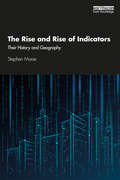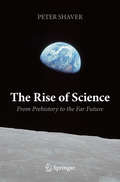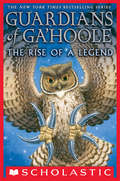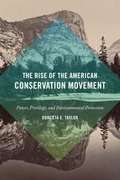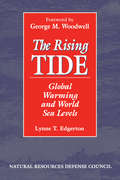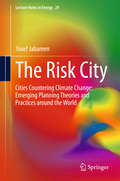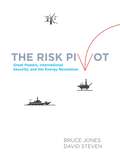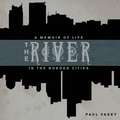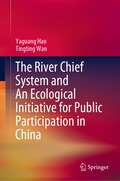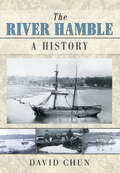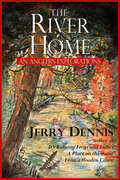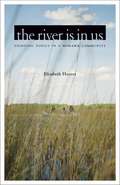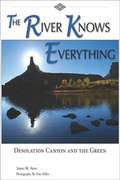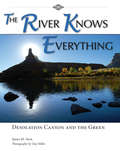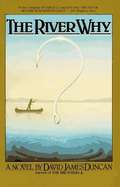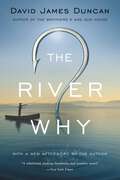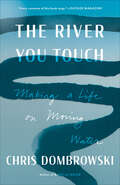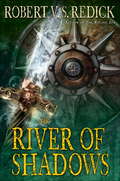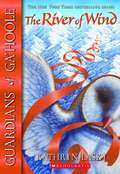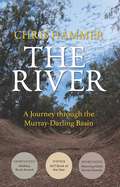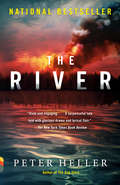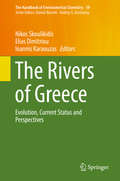- Table View
- List View
The Rise and Rise of Indicators: Their History and Geography
by Stephen MorseThis book makes indicators more accessible, in terms of what they are, who created them and how they are used. It examines the subjectivity and human frailty behind these quintessentially ‘hard’ and technical measures of the world. To achieve this goal, The Rise and Rise of Indicators presents the world in terms of a selected set of indicators. The emphasis is upon the origins of the indicators and the motivation behind their creation and evolution. The ideas and assumptions behind the indicators are made transparent to demonstrate how changes to them can dramatically alter the ranking of countries that emerge. They are, after all, human constructs and thus embody human biases. The book concludes by examining the future of indicators and the author sets out some possible trajectories, including the growing emphasis on indicators as important tools in the Sustainable Development Goals that have been set for the world up until 2030. This is a valuable resource for undergraduate and postgraduate students in the areas of economics, sociology, geography, environmental studies, development studies, area studies, business studies, politics and international relations.
The Rise of Science: From Prehistory to the Far Future
by Peter ShaverHow did science rise up to so dramatically change our world, and where will it take us in the future? This book gives a unique and broad overview. A brief history reveals the major phases and turning points in the rise of science from the earliest civilizations to the present: How was science ‘discovered’? Why did it disappear a few times? When did it become ‘modern’? A critical assessment examines how science actually ‘happens’: the triumphs, the struggles, the mistakes and the luck. Science today is endlessly fascinating, and this book explores the current exponential growth, curiosity-driven vs. goal-oriented research, big and small science, the support of science, the relation of science to society, philosophy and religion, and the benefits and dangers of science. Finally a glimpse into the future: Will the current pace of science continue? Will we ever go backwards (again)? What remains to be discovered? Can science ever be complete? What can we imagine for the distant future? This book will be of wide interest to the general reader as well as to students and working scientists.This book provides a fresh, unique and insightful coverage of the processes of science, its impact on society and our understanding of the world, based on the author’s experience gained from a lifetime in science.Ron Ekers, FRS, CSIRO Fellow, CSIRO Astronomy & Space Science, former President of the International Astronomical UnionPeter Shaver's comprehensive and lively survey deserves a wide readership. Scientific discoveries are part of our global culture and heritage, and they underpin our lives. It's fascinating to learn how they were made, and how they fit into the grand scheme. This book isn't just for scientists - it's written for all of us.Martin Rees, FRS, Astronomer Royal, former President of the Royal Society and former Master of Trinity College, CambridgeThis book offers a wonderfully concise and accessible insight into science – its history, breadth and future prospects. Peter Shaver gives a feeling for what it actually means to be a practicing scientist.Stephen Simpson, FRS, Academic Director, Charles Perkins Centre, School of Life and Environmental Sciences, University of Sydney
The Rise of a Legend: The Rise of a Legend (Guardians of Ga'Hoole)
by Kathryn LaskyBestselling author Kathryn Lasky takes flight once more with a brand-new Guardians of Ga'Hoole novel!An owlet hatches out onto Stormfast Island and into a world torn by war. For one hundred years, his people have fought off enemy owls from the Ice Talons, but the tide has turned. An invasion is coming, one the Kielian League won't have the strength to resist. Soon the tyrant owl Bylyric will rule over everything, and no honorable owl will be safe. Only the small owl from Stormfast stands between Bylyric and total victory. Lyze is not very impressive to look at, but he has a wild idea for a snake and owl strike unit that just might give the soldiers of the Kielian League the edge they need.This is his story, the story of an ordinary owl who rose to become Ezylryb of the Great Tree. This is the story of what it takes to make a Guardian of Ga'Hoole.
The Rise of the American Conservation Movement: Power, Privilege, and Environmental Protection
by Dorceta E. TaylorIn this sweeping social history Dorceta E. Taylor examines the emergence and rise of the multifaceted U.S. conservation movement from the mid-nineteenth to the early twentieth century. She shows how race, class, and gender influenced every aspect of the movement, including the establishment of parks; campaigns to protect wild game, birds, and fish; forest conservation; outdoor recreation; and the movement's links to nineteenth-century ideologies. Initially led by white urban elites--whose early efforts discriminated against the lower class and were often tied up with slavery and the appropriation of Native lands--the movement benefited from contributions to policy making, knowledge about the environment, and activism by the poor and working class, people of color, women, and Native Americans. Far-ranging and nuanced, The Rise of the American Conservation Movement comprehensively documents the movement's competing motivations, conflicts, problematic practices, and achievements in new ways.
The Rising Tide: Global Warming And World Sea Levels
by Lynne EdgertonThe Rising Tide is the first analysis of global warming and world sea level rise. It outlines state, national, and international actions to respond to the effects of global warming on coastal communities and ecosystems.
The Risk City
by Yosef JabareenContemporary cities face phenomenal risks, and they face particularly high levels of mounting social and environmental risks, including social polarization, urban conflicts, riots, terror, and climate change threats. This book suggests that climate change and its resulting uncertainties challenge the concepts, procedures, and scope of conventional approaches to planning, creating a need to rethink and revise current planning methods. Therefore, this book suggests a paradigm shift in our thinking, interrogation, and planning of our cities. Based on the contemporary conditions of risk at cities, this book conceptualizes the risk city as a construct of three interlinked concepts of risk, trust, and practice. It is a construct of risk and its new evolving conditions and knowledge of uncertainties stem from climate change and other risks and uncertainties. As a construct of practices, the risk city produces social and political institutional framework and promotes practices accordingly in order to reduce risk and risk possibilities and to increase trust. In light of the complex challenges and risks to the human habitat that have emerged in recent years, many cities have prepared various types of plans aimed at addressing the challenges posed by climate change. Nonetheless, despite the importance of these plans and the major public resources invested in their formulation, we still know little about them and have yet to begin studying them and assessing their contributions . From the innovative perspective of the risk city, this book asks critical questions about the nature, vision, practices, and potential impact of the recent climate change-oriented plans. What kinds of risks do they attempt to address, what types of practices do they institute, and what types of approaches do they apply? Do they adequately address the risks and uncertainties posed? How do they contribute to the worldwide effort to reduce greenhouse gas emissions? This book uses the methodologically innovative Risk City framework to examine the nature, vision, outcomes, practices, and impact of these crucial plans, as well as their contribution to the resilience of our cities and to global efforts toward reducing greenhouse gas emissions.
The Risk Pivot
by Bruce D. Jones David StevenThe last decade has seen a revolution in global energy. First, we saw explosive growth in demand from Asia's rising powers, which fueled fears about scarcity and conflict. But we've also seen an American revolution in technology and markets, resulting in a dramatic increase in sup-ply. This is strengthening America's hand in the world--but it's not without complications. There are major security consequences of these shifts. Among the most consequential are China and India, Asia's emerging giants, which are increasingly exposed to political risks associated with energy risks, as well as the energy flows, pivoting to Asia. Meanwhile the great powers struggle to balance their need for fossil fuels with a mounting effort to tackle climate change. The top powers, and the United States above all, face a stra-tegic choice: whether to use energy as a weapon of geopolitics, or as a tool of a stable order.CONTENTS Introduction1. The President and the King--Key Messages of the Book2. The Energy Revolutions--A PrimerGeopolitics in Flux--The Players3. Choices--Scenarios, and the Choice the Powers Confront4. Rough Seas Ahead--The Great Powers' Search for Energy SecurityGlobalization and Complexity--The Problems5. Transition in the Gulf6. The Turbulent Middle7. Fragile States8. The Russian Problem9. Connections--from Pipelines to PoliticsGovernance--The Partners10. An Emerging System of Global Energy Governance11. Leadership Choices
The Risk Pivot
by Bruce D. Jones David StevenThe last decade has seen a revolution in global energy. First, we saw explosive growth in demand from Asia's rising powers, which fueled fears about scarcity and conflict. But we've also seen an American revolution in technology and markets, resulting in a dramatic increase in sup-ply. This is strengthening America's hand in the world-but it's not without complications. There are major security consequences of these shifts. Among the most consequential are China and India, Asia's emerging giants, which are increasingly exposed to political risks associated with energy risks, as well as the energy flows, pivoting to Asia. Meanwhile the great powers struggle to balance their need for fossil fuels with a mounting effort to tackle climate change. The top powers, and the United States above all, face a stra-tegic choice: whether to use energy as a weapon of geopolitics, or as a tool of a stable order.CONTENTSIntroduction1. The President and the King-Key Messages of the Book2. The Energy Revolutions-A PrimerGeopolitics in Flux-The Players3. Choices-Scenarios, and the Choice the Powers Confront4. Rough Seas Ahead-The Great Powers' Search for Energy SecurityGlobalization and Complexity-The Problems5. Transition in the Gulf6. The Turbulent Middle7. Fragile States8. The Russian Problem9. Connections-from Pipelines to PoliticsGovernance-The Partners10. An Emerging System of Global Energy Governance11. Leadership Choices
The River
by Paul Vasey"Ask anyone what they love most about Winzer, and they seem always to tell you it's the people, the family and friends webbed around each of us. True. But for me the town is also, and perhaps mainly, the larger-than-life characters who ghost around in my imagination and my memory: rumrunners and prize fighters and elegant old ladies and one-eyed thugs and earnest well-meaning politicians and hucksters and hookers and crusty old editors. Many of them I remember meeting. Some of them I actually met." -from The RiverThe River is Paul Vasey's tribute to a place he discovered by accident and loved over a lifetime. Chatty, anecdotal, personal and passionate, by one of Windsor's most celebrated reporters and radio hosts, this meandering memoir winds its way around a river town whose sights and characters may never be fully charted: a Windsor that fired a reporter's imagination, stole his heart, and eventually became the place he calls home.
The River Chief System and An Ecological Initiative for Public Participation in China
by Yaguang Hao Tingting WanThis book provides an alternative agenda to deepening the understanding of the River Chief System as a distinctive responsibility approach to solve water pollution and associated governance dilemmas. Insightful analysis is performed through in-depth studies of the origins of China’s River Chief System, responsibility mechanisms, governmental and civil river chiefs, formal and informal water governing institutions, public participation, empowerment with accountability, and the environmental impact.
The River Hamble: A History
by David ChunThe Hamble rises at Bishop’s Waltham in Hampshire and flows into Southampton Water. It is a relatively small river but it has an interesting and varied history. Above Botley, the Hamble powered a number of mills, and in the 17th century plans to make that section navigable were contemplated. The tidal river below Botley has served as an important local conduit for the carriage of goods and commodities, particularly timber, underwood and fl our, and a number of industries, including fishing and salt production, have flourished on its banks over the centuries. King Henry V’s fleet was stationed on the river and in the 18th and 19th centuries it was an important location for naval shipbuilding, not least because of the ample supplies of timber to be found in the valley. One of Nelson’s flagships, HMS Elephant, was built there in the 1800s. The proximity of Southampton and Portsmouth meant the river was militarily important during the Second World War as well as in earlier conflicts. It also boasts a number of literary associations, particularly that of William Cobbett, who lived and farmed at Botley for a number of years at the beginning of the 19th century. The river has been a popular centre for yachting for over 100 years and there are a number of boatyards and marinas along its lower reaches today. However, despite this and other commercial development, the river is still prized for its natural beauty, and large sections are protected for their ecological and conservation value. Drawing on printed and archival sources, and with a wealth of illustrations, this book traces the river from its source to the sea.
The River Home: An Angler's Explorations
by Jerry DennisIn this remarkable collection of essays and stories, winner of the Best Book of the Year Award from the Outdoor Writers Association of America, Jerry Dennis demonstrates why he has emerged as one of America's finest writers on nature and the outdoors. In prose that has drawn comparisons with John Voelker, Sigurd Olson, and Aldo Leopold, Dennis celebrates the simple pleasures and complex challenges of family life, the allure of giant trout, the sacredness of secret places, and such wonders as bad weather, quirky fishing companions, and the occasional naked angler. Ranging from northern Michigan to Iceland, Chile, and the fabled rivers of the American West, The River Home is a passionate record of a life lived fully, crafted with clarity, insight, and good humor—by a writer gifted with an instinct for what matters. PRAISE:"This bright and sharply written book is a guide to a life lived consciously, a prerequisite and bonus of the sport done well." —Lisa Faye Kaplan, USA Today&“Collections of essays about the outdoors and fishing crowd the shelves, but Dennis&’s fresh writing and marvelous insights merit special attention. This fine collection will appeal to fans of Hal Borland, W.D. Wetherell, and Nick Lyons, as well as to those who enjoy the essays of fiction writers William Tapply and Thomas McGuane.&” —Booklist&“Even if you&’ve never pulled on a pair of waders, you should read this funny and wise book about fly fishing – and a lot more.&” —Georgia Times-Union&“In this book, Dennis elevates the typical &‘outdoor&’ essay, usually a mere recollection of adventures while hunting, fishing, camping, canoeing, or pursuing other outdoor activities. He has transcended the typical by blending in elements of &‘nature&’ writing: observation, research, speculation about the world in which the sportsman places himself.&” —The Oakland Press
The River Horse
by Nina Ames FreyEvery child wants a horse, and Arana, a young Mayan Indian boy living in a Guatemalan village, is no exception. From his grandfather he hears tales of his people's past greatness. He hears, too, stories of how the Spanish soldiers came, mounted on their horses, and conquered his ancestors, who had never seen horses and were afraid. One day in the forest with his father he sees a danta, a little wild animal native to Guatemala that is known as a river horse. Arana returns to the forest on his own to try to capture the little danta and have the rare river horse for his own.
The River Is in Us: Fighting Toxics in a Mohawk Community
by Elizabeth HooverWinner of the Labriola Center American Indian National Book Award 2017 Mohawk midwife Katsi Cook lives in Akwesasne, an indigenous community in upstate New York that is downwind and downstream from three Superfund sites. For years she witnessed elevated rates of miscarriages, birth defects, and cancer in her town, ultimately drawing connections between environmental contamination and these maladies. When she brought her findings to environmental health researchers, Cook sparked the United States&’ first large-scale community-based participatory research project.In The River Is in Us, author Elizabeth Hoover takes us deep into this remarkable community that has partnered with scientists and developed grassroots programs to fight the contamination of its lands and reclaim its health and culture. Through in-depth research into archives, newspapers, and public meetings, as well as numerous interviews with community members and scientists, Hoover shows the exact efforts taken by Akwesasne&’s massive research project and the grassroots efforts to preserve the Native culture and lands. She also documents how contaminants have altered tribal life, including changes to the Mohawk fishing culture and the rise of diabetes in Akwesasne.Featuring community members such as farmers, health-care providers, area leaders, and environmental specialists, while rigorously evaluating the efficacy of tribal efforts to preserve its culture and protect its health, The River Is in Us offers important lessons for improving environmental health research and health care, plus detailed insights into the struggles and methods of indigenous groups. This moving, uplifting book is an essential read for anyone interested in Native Americans, social justice, and the pollutants contaminating our food, water, and bodies.
The River Knows Everything
by James M. AtonDesolation Canyon is one of the West's wild treasures. Visitors come to study, explore, run the river, and hike a canyon that is deeper at its deepest than the Grand Canyon, better preserved than most of the Colorado River system, and full of eye-catching geology-castellated ridges, dramatic walls, slickrock formations, and lovely beaches. Rafting the river, one may see wild horses, blue herons, bighorn sheep, and possibly a black bear. Signs of previous people include the newsworthy, well-preserved Fremont Indian ruins along Range Creek and rock art panels of Nine Mile Canyon, both Desolation Canyon tributaries. Historic Utes also pecked rock art, including images of graceful horses and lively locomotives, in the upper canyon. Remote and difficult to access, Desolation has a surprisingly lively history. Cattle and sheep herding, moonshine, prospecting, and hideaways brought a surprising number of settlers--ranchers, outlaws, and recluses--to the canyon.
The River Knows Everything: Desolation Canyon and the Green
by James M AtonDesolation Canyon is one of the West's wild treasures. Visitors come to study, explore, run the river, and hike a canyon that is deeper at its deepest than the Grand Canyon, better preserved than most of the Colorado River system, and full of eye-catching geology-castellated ridges, dramatic walls, slickrock formations, and lovely beaches. Rafting the river, one may see wild horses, blue herons, bighorn sheep, and possibly a black bear. Signs of previous people include the newsworthy, well-preserved Fremont Indian ruins along Range Creek and rock art panels of Nine Mile Canyon, both Desolation Canyon tributaries. Historic Utes also pecked rock art, including images of graceful horses and lively locomotives, in the upper canyon. Remote and difficult to access, Desolation has a surprisingly lively history. Cattle and sheep herding, moonshine, prospecting, and hideaways brought a surprising number of settlers--ranchers, outlaws, and recluses--to the canyon.
The River Why
by David James DuncanNot in recent memory has there been such a unique and vibrant fictional character--a character who could make us laugh so easily, feel so deeply, who speaks with such startling truth about the way we live, as Gus Orviston--the irreverent young fly fisherman in "The River Why."
The River Why
by David James DuncanThe classic novel of fly fishing and spirituality, originally published in 1983.Since its publication in 1983, THE RIVER WHY has become a classic. David James Duncan's sweeping novel is a coming-of-age comedy about love, nature, and the quest for self-discovery, written in a voice as distinct and powerful as any in American letters.Gus Orviston is a young fly fisherman who leaves behind his comically schizoid family to find his own path. Taking refuge in a remote cabin, he sets out in pursuit of the Pacific Northwest's elusive steelhead. But what begins as a physical quarry becomes a spiritual one as his quest for self-knowledge batters him with unforeseeable experiences. Profoundly reflective about our connection to nature and to one another, THE RIVER WHY is also a comedic rollercoaster. Like Gus, the reader emerges utterly changed, stripped bare by the journey Duncan so expertly navigates.
The River You Touch: Making a Life on Moving Water
by Chris Dombrowski“We are matter and long to be received by an Earth that conceived us, which accepts and reconstitutes us, its children, each of us, without exception, every one. The journey is long, and then we start homeward, fathomless as to what home might make of us.” —from The River You Touch When Chris Dombrowski burst onto the literary scene with Body of Water, the book was acclaimed as “a classic” (Jim Harrison) and its author compared with John McPhee. Dombrowski begins the highly anticipated All of It Everywhere with a question as timely as it is profound: “What does a meaningful, mindful, sustainable inhabitance on this small planet look like in the anthropocene?” He answers this fundamental question of our time initially by listening lovingly to rivers and the land they pulse through in his adopted home of Montana. Transplants from the post-industrial Midwest, he and his partner, Mary, assemble a life based precariously on her income as a schoolteacher, his as a poet and fly-fishing guide. Before long, their first child arrives, followed soon after by two more, all “free beings in whom flourishes an essential kind of knowing […], whose capacity for wonder may be the beacon by which we see ourselves through this dark epoch.” And around the young family circles a community of friends -- river-rafting guides and conservationists, climbers and wildlife biologists -- who seek to cultivate a way of living in place that moves beyond the mythologized West of appropriation and extraction. Moving seamlessly from the quotidian -- diapers, the mortgage, a threadbare bank account -- to the metaphysical -- time, memory, how to live a life of integrity -- Dombrowski illuminates the experience of fatherhood with intimacy and grace. Spending time in wild places with their children, he learns that their youthful sense of wonder at the beauty and connectivity of the more-than-human world is not naivete to be shed, but rather wisdom most of us lose along the way -- wisdom that is essential for the possibility of transformation.
The River of Shadows
by Robert V. RedickIn the gripping sequel to Robert V. S. Redick's acclaimed epic fantasy novels The Red Wolf Conspiracy and The Ruling Sea, the crew of the vast, ancient ship Chathrand have reached the shores of the legendary southern empire of Bali Adro. Many have died in the crossing, and the alliance of rebels, led by the tarboy Pazel Pathkendle and the warrior Thasha Isiq, has faced death, betrayal, and darkest magic. But nothing has prepared them for the radically altered face of humanity in the South. They have little time to recover from the shock, however. For with landfall, the battle between the rebels and centuries-old sorcerer Arunis enters its final phase. At stake is control of the Nilstone, a cursed relic that promises unlimited power to whoever unlocks the secrets of its use--but death to those who fail. And no one is closer to mastering the Stone than Arunis. Desperate to stop him, Pazel and Thasha must join forces with their enemies, including the depraved Captain Rose and the imperial assassin Sandor Ott. But when a suspicious young crewmember turns his attentions to Thasha, it is the young lovers themselves who are divided--most conveniently for Arunis. As the mage's triumph draws near, the allies face a terrible choice: to break their oaths and run for safety, or to hunt the world's most dangerous sorcerer through the strange and deadly dream kingdom known as the River of Shadows, and to face him a last time among the traps and horrors of his lair. Brimming with high adventure, dark enchantment, and unforgettable characters, The River of Shadows deftly secures Redick's place in the ranks of epic fantasy's most original and enthralling storytellers.From the Hardcover edition.
The River of Wind (Guardians of Ga'Hoole #13)
by Kathryn LaskyIn this Guardians of Ga'Hoole Series Book 13, Coryn and the Band have returned to the Great Ga'Hoole Tree and restored order. With the Ember safely hidden away, the tree shakes off its gaudy golden glow and recovers its natural majesty.
The River: A Journey through the Murray-Darling Basin
by Chris HammerAustralia's major river system is collapsing. Parts of it are dying; parts of it are already dead. Australia's most significant river no longer reaches the sea. I look out into the dim autumn light and wonder once again how it has come to this . . . Join award-winning author Chris Hammer on a journey through Australia's largest river system, the Murray-Darling Basin. His travels during the crippling millennium drought take us through riverland communities, sharing the laughter, sadness and reflections of the people he meets along the way. The River looks past the daily news reports and their sterile statistics to reveal the true impact of our rivers' decline on the people who live along their shores, and on the country as a whole. It's a tale that leaves the reader with nostalgia for an Australia that may be fading away forever. First published in 2010, The River continues to be read as a history, as a prophecy – and as both. This updated edition includes a new introduction from the author.
The River: A novel (Vintage Contemporaries Ser.)
by Peter HellerNATIONAL BESTSELLER • From the author of The Guide and The Dog Stars comes the story of two college students on a wilderness canoe trip—a gripping tale of a friendship tested by fire, white water, and violence."A fiery tour de force … I could not put this book down. It truly was terrifying and unutterably beautiful."—The Denver PostWynn and Jack have been best friends since college orientation, bonded by their shared love of mountains, books, and fishing. Wynn is a gentle giant, a Vermont kid never happier than when his feet are in the water. Jack is more rugged, raised on a ranch in Colorado where sleeping under the stars and cooking on a fire came as naturally to him as breathing. When they decide to canoe the Maskwa River in northern Canada, they anticipate long days of leisurely paddling and picking blueberries, and nights of stargazing and reading paperback Westerns. But a wildfire making its way across the forest adds unexpected urgency to the journey. One night, with the fire advancing, they hear a man and woman arguing on the fog-shrouded riverbank; the next day, a man appears on the river, paddling alone. Is this the same man they heard? And if he is, where is the woman? From this charged beginning, master storyteller Peter Heller unspools a headlong, heart-pounding story of desperate wilderness survival. Look for Peter Heller's new novel, The Last Ranger, coming soon!
The Rivers of Greece
by Nikos Skoulikidis Elias Dimitriou Ioannis KaraouzasThis volume provides essential information on the origin and evolution of Greek rivers, as well as their ecological and anthropogenic characteristics. The topics covered include geomythology, biogeography, hydrology, hydrobiology, hydrogeochemistry, geological and biogeochemical processes, anthropogenic pressures and ecological impacts, water management - both in the antiquity and today - and river restoration. The book is divided into four parts, the first of which explores the importance of rivers for ancient Greek civilization and the natural processes affecting their evolution during the Holocene. In the second part, the hydrological, hydrochemical and biological features of Greek rivers and the unique biogeographical characteristics that form the basis for their high biodiversity and endemism are highlighted, while the third part comprehensively discusses the impacts of environmental pollution on the structure and function of Greek river ecosystems. In turn, the final part describes the current socio-economic factors in Greece that are affecting established water management practices, the application of ecohydrological approaches in restoring fragmented rivers, and the lessons learned from restoring aquatic ecosystems in general as a paradigm for understanding and minimizing anthropogenic impacts on water resources, at the Mediterranean scale. Given the breadth and depth of its coverage, the book offers an invaluable source of information for researchers, students and environmental managers alike.
